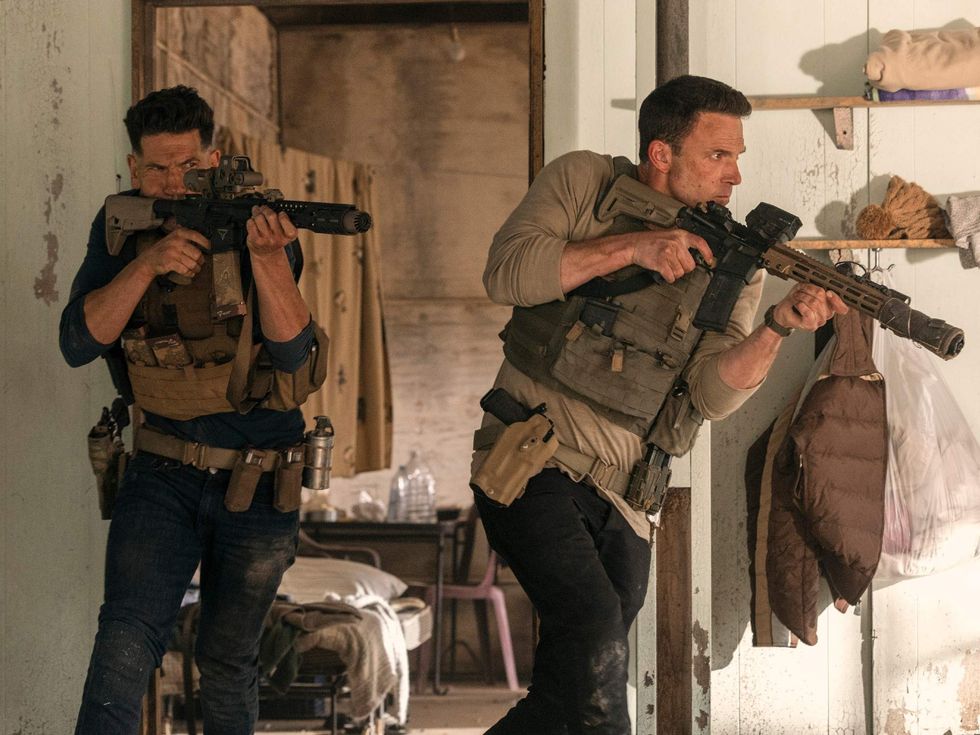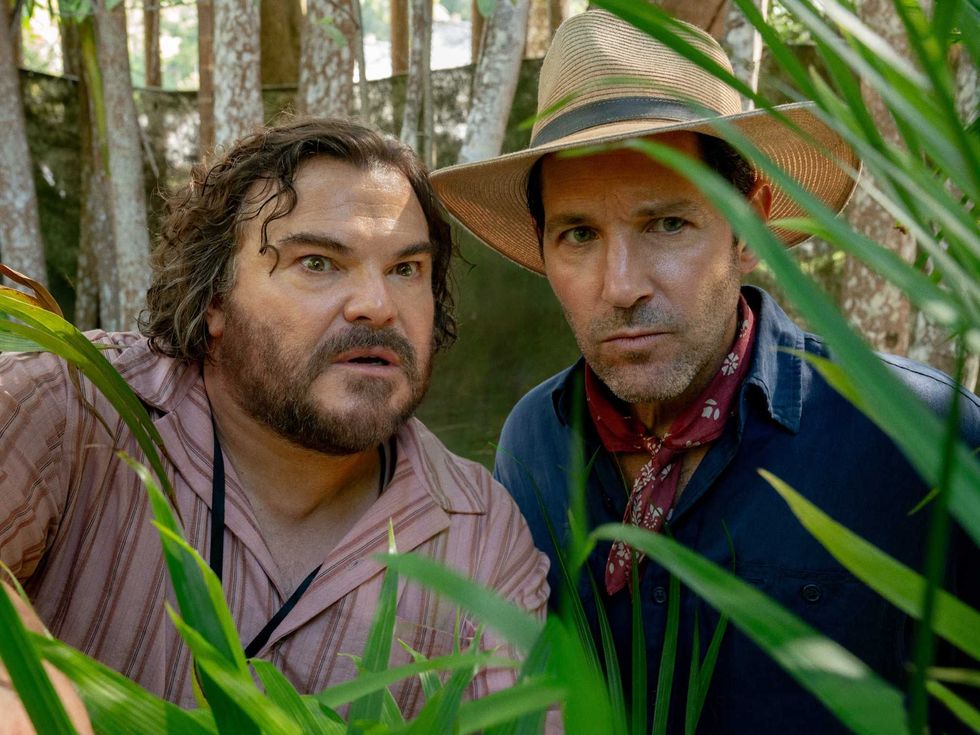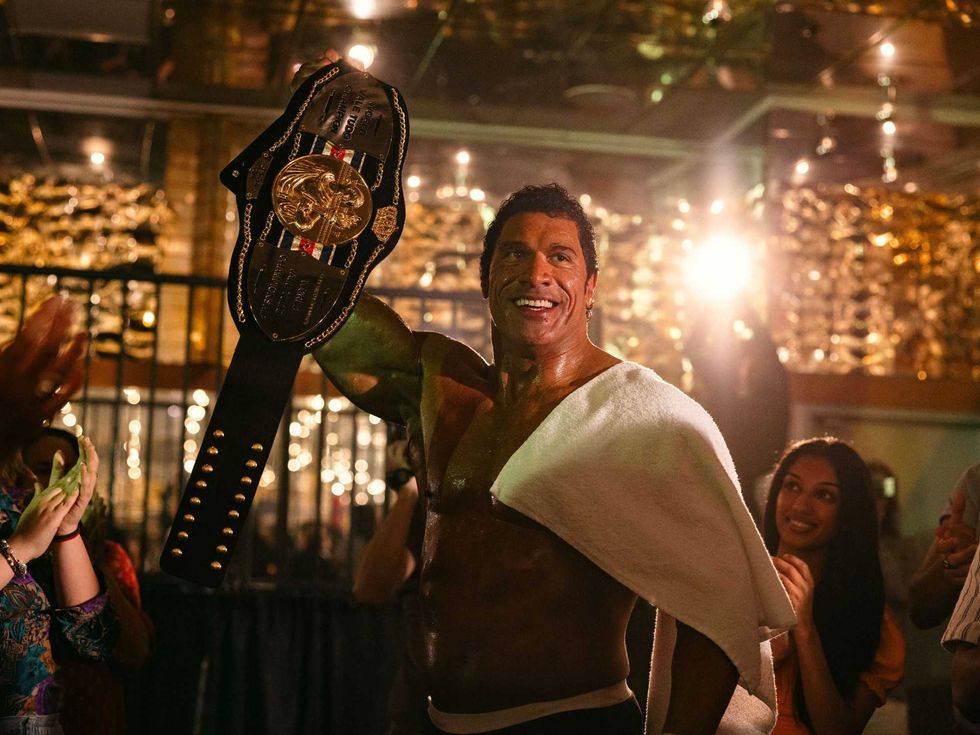No Retreat, No Surrender
How Tom Hanks saved Bruce Springsteen's career: Songs 51-40 are Glory Daysindeed
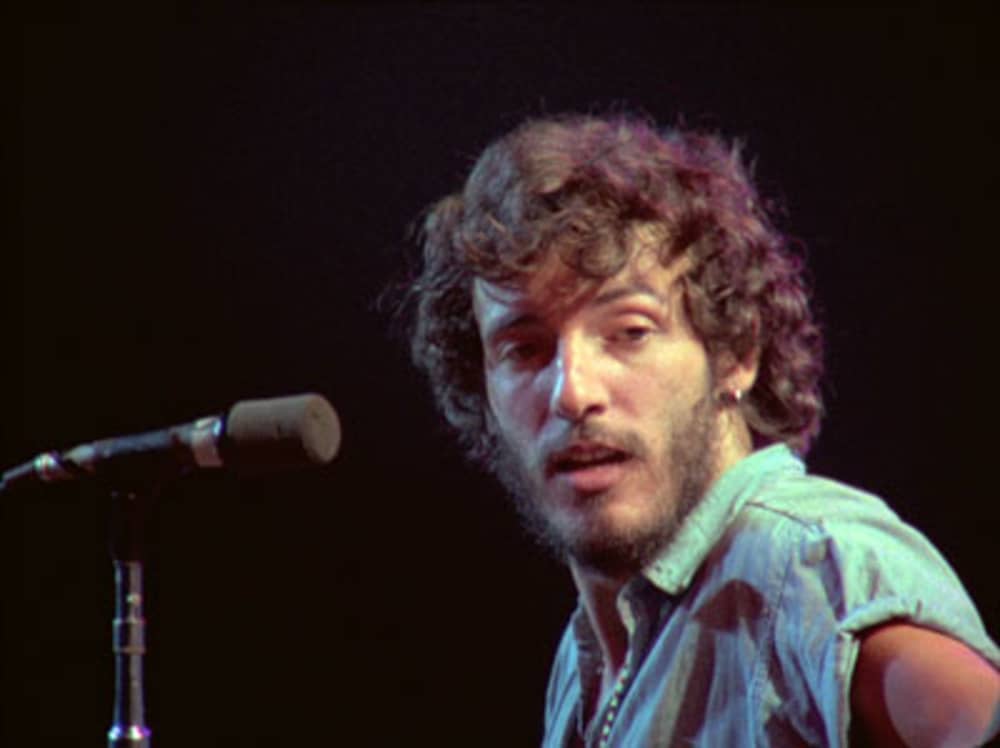 Bruce Springsteen wasn't always such a sure sell as he is today.
Bruce Springsteen wasn't always such a sure sell as he is today. Tom Hanks' performance in "Philadelphia" helped Springsteen's great song getnoticed.
Tom Hanks' performance in "Philadelphia" helped Springsteen's great song getnoticed.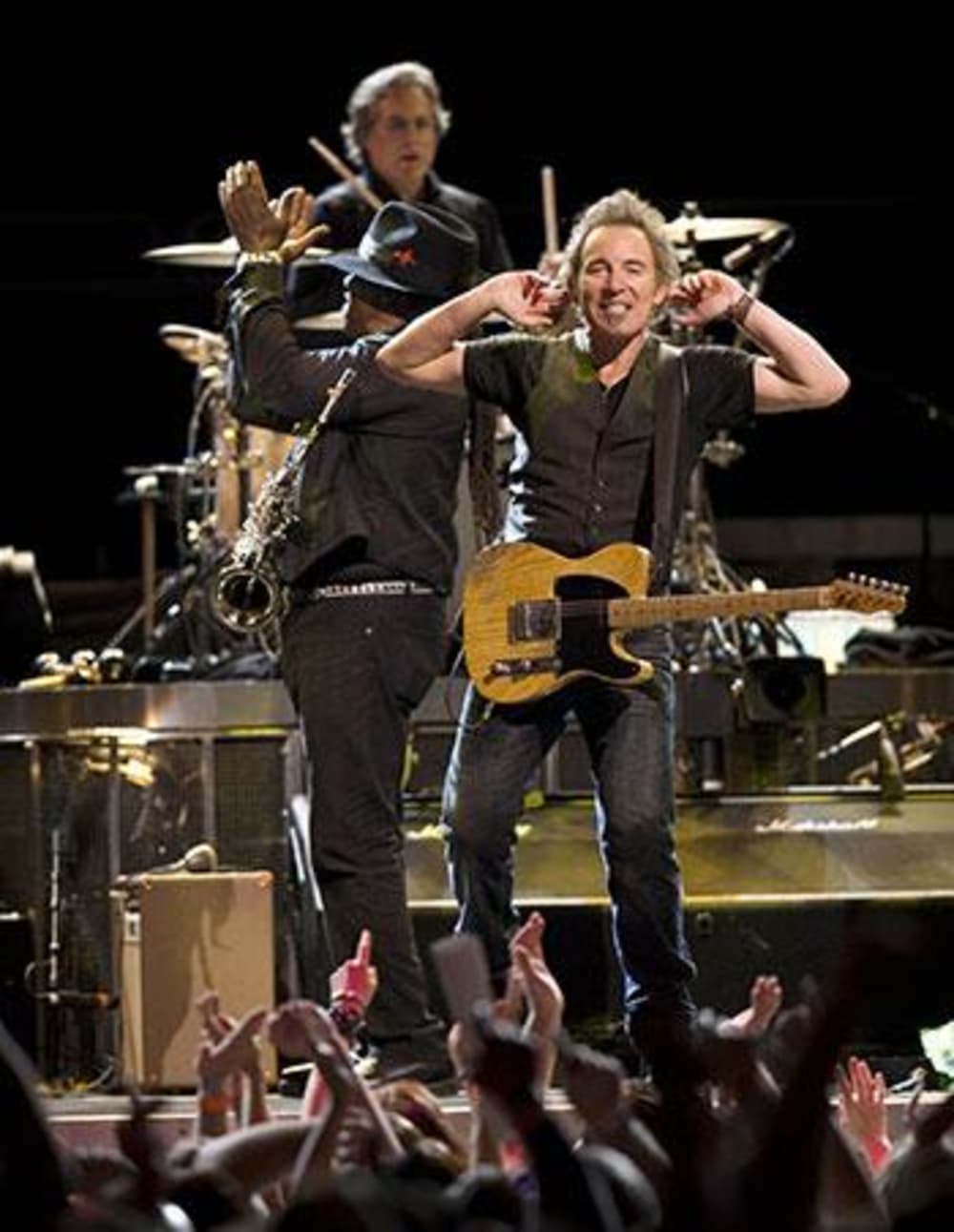 Springsteen has enjoyed a lot of different career "Glory Days."
Springsteen has enjoyed a lot of different career "Glory Days."
Bruce Springsteen wasn't always as popular as he is now. In the early 1990s, it almost looked like he was rocking on fumes, struggling to stay relevant as he did his own thing. Then, Tom Hanks came along to play a gay lawyer with AIDS fighting workplace discrimination in a powerful movie that needed an equally ground-breaking theme song.
The Boss churned out "Philadelphia" and has really never looked back.
You could almost say he was back in his "Glory Days" — another Springsteen classic that makes the Top 50 in The Ultimate Springsteen Countdown. Someone cue Dick Clark. Next week, we'll be in the Top 40.
Song 50: “None But the Brave”
Album: The Essential Bruce Springsteen
Adobe Flash Required for flash player.
No instrument conjures nostalgia quite like a saxophone, so it’s fitting that this Born In The U.S.A. outtake, which in many ways concerns the way the past has a way of sneaking up on you, is bookended by Clarence Clemons mirroring the main melody and imbuing the notes with just the right touch of grandeur and heartbreak. There’s a little bit of Roy Orbison in the melody, maybe even a touch of Frankie Valli.
But truly it’s classic E Street Band more than anything else, and it hits another level of majesty in Bruce’s soaring guitar solo.
Although Springsteen never comes right out and says it, it seems that the girl he’s singing to might have passed away, a victim of the nightlife which the narrator is still drawn to in spite of this cold truth. The girl in this song might be the same girl from “Point Blank,” having never made it out of the existential hole she was trapped in during that song. Bruce sings here with a little less rancor and a little more empathy than in “Point Blank,” which is why this song works better in my eyes.
The final scene, as the guy trolls the local dives and finds a poor substitute for his former flame and dances with the new girl in a meaningless pantomime of the real thing, is a true heartbreaker. In futile frustration, Springsteen lashes out at the fates: “Now who’s the man who thinks he can decide/Whose dreams will live and whose shall be pushed aside.”
When it finally made it onto the bonus disc of The Essential Bruce Springsteen, “None But The Brave” must have confounded the faithful as to how a seemingly flawless construction ended up on the cutting-room floor. The answer: With a talent like Springsteen, no amount of vinyl can quite contain his artistic outflow.
Song 49: “Streets of Philadelphia”
Album: The Essential Bruce Springsteen
Adobe Flash Required for flash player.
Lost somewhat in the praise that it received, the awards it garnered, and the cultural ubiquity it enjoyed as it rode the coattails of a groundbreaking movie is the fact that “Streets Of Philadelphia” reestablished Bruce Springsteen as a major musical force at a time when many of even his most ardent admirers might have questioned whether that was possible. Remember that the Human Touch and Lucky Town albums didn’t exactly set the world on fire, at least by Springsteenian standards, and Bruce seemed a bit lost without the E Street Band in his corner.
Then “Streets Of Philadelphia” came along and changed all that, as Bruce reminded everyone that he had a way of connecting with the public without pandering that few artists have ever enjoyed. The ironic thing about the song is that it was essentially a demo, hence the drum machine and relatively spare arrangement (although the brooding synths certainly fill things out). But Philadelphia director Jonathan Demme realized that the song perfectly fit the tenor of his film just as it was.
The lyrics work on a grand scale because Springsteen doesn’t narrow the focus too much. While they certainly apply to Tom Hanks' AIDS-afflicted lawyer from the movie, they also hit home to anyone who’s ever felt the sting of isolation. The darkness is palpable: “At night I could hear the blood in my veins/Black and whispering as the rain.”
In turn, the broader focus also enables Springsteen to earn empathy for those with the disease, since he shows how they are no different from anyone else who is suffering and looking for companionship in their darkest hour: “So receive me, brother, with your faithless kiss/Or will we leave each other alone like this.”
Springsteen didn’t need Oscar and Grammy love to remind everyone of just how brilliant he is. This staggering testament to brotherly love accomplished that just fine.
Song 48: “Devils & Dust”
Album: Devils & Dust
Adobe Flash Required for flash player.
“I got my finger on the trigger/But I don’t know who to trust.” Those two lines incisively dissect the travails of a soldier in the Iraq War. Considering that this song was written years ago, well before statistics began to emerge which delineated the psychological issues many soldiers dealt with upon returning home and the high suicide rates among the military, it seems eerily prescient.
Springsteen was on to something: What does it do to one’s soul if they’re killing for something that they don’t believe in?
Or as Bruce puts it: “What if what you do to survive kills the things you love?” He sings it over a melody that seems simple enough but insinuates itself into your consciousness with striking ease. What starts out as an acoustic lament gains steam thanks to Steve Jordan’s hip-hop flavored beat and a cathartic harmonica part by Bruce.
It turns what could have been a standard folk song into something far more dynamic and memorable.
As the solider in “Devils & Dust” struggles to find faith despite the promise of having “God on our side,”his fear and loneliness begin to swirl in all around him, thick as the desert air. That this good soldier has to face these demons for reasons that seemed specious then and are practically non-existent now is the great tragedy at the heart of this stunning song.
Song 47: "Shut Out the Light”
Album: Tracks
Adobe Flash Required for flash player.
Springsteen has always had tremendous success writing about war and its heinous effects on mankind because of two strategies. First of all, he keeps the stories focused on individuals, thereby humanizing the abstract issue of war at large. Second, he always seems to find new and different ways to tackle the issue in song.
“Shut Out The Light” is a song about a guy coming back from war, but you have to look hard to find that out from the lyrics. The first verse seems to relate a sexual liaison, while the third just has Johnson Lanier, the protagonist, standing in a river. Only the second, which shows his family celebrating his return and trotting his talismanic Ford out for display, alludes to some kind of homecoming.
But the signs are there, both in the mournful violin that weaves through the song and in the hole in Springsteen’s voice as he sings the story. Notice that Johnny never speaks in the song save for his pleas in the chorus to keep the lights on. He’s almost an apparition as he weaves through a hometown that suddenly seems foreign to him.
His seemingly unshakable demeanor falls apart at night, when we assume that the memories of his former life come creeping beside him in bed, the ghost of a man haunted by ghosts of his own. “Shut Out The Light” is filled with telling details, but it’s what Springsteen leaves out of the story that really grabs you.
Song 46: “The Last Carnival”
Album: Working On a Dream
Adobe Flash Required for flash player.
If you get the chance sometime, look up Bruce Springsteen’s eulogy for Danny Federici online. When you get finished wiping away the tears, you’ll likely wish that someday, when you shuffle off that mortal coil, you will have been loved enough to merit such a touching tribute. And you’ll wish that when that day comes, you’ll have someone as eloquent as Bruce to send you off.
But Bruce didn’t stop with just a eulogy. He wrote this heart-rending goodbye and cleverly made it a sort of sequel to 1973’s “Wild Billy’s Circus Story.” At the end of that previous song, Billy joins the Big Top. Here, it’s time for him to get off, and Springsteen can’t imagine the circus life without his good friend, but he knows that the train will roll on anyway.
The music is balanced on a high wire between the gentle acoustic guitar and the sounds of the Midway, some of which are provided by Federici’s son, Jason, who plays accordion on the track. At the very end, the members of the E Street Band get together for a wordless cry that’s part loving benediction and part cathartic yowl of pain. Even with no words, you can tell just how they all felt about the man known as Phantom Dan.
Song 45: “Glory Days”
Album: Born In The U.S.A.
Adobe Flash Required for flash player.
It’s become such a party song over the years that it’s easy to miss just how much Bruce Springsteen gets right in “Glory Days.” As the resident of a small town for just about all of my 37 years on this earth, I know the people in this song. The characterizations are so spot-on that I recognize the faded athlete who still commands respect (and free drinks) even after he’s long since lost his mojo. I recognize the former queen of the high school hallways who married too soon and thought too late.
And, like Springsteen, I have affection for these characters. I’d say something like, “There but for the grace of his guitar goes Bruce,” but I would guess that Bruce doesn’t think himself above these people in any way. After all, the third verse is a portrait of the narrator, realizing that he can blabber on about the glory days just like anybody else. No condescension at all, or else the song wouldn’t have worked.
All of that lyrical dexterity gets lost a bit in the ramshackle brilliance of the music and that thrilling chorus. The opening guitar riff immediately places you in a small-town bar, although the E Streeters are a notch or two above your average bar-band.
The keyboards are typically on-point, Max Weinberg clobbers the skins, and Steven Van Zandt, usually behind-the-scenes musically even as he steps out front on stage, takes a mandolin solo that finds the melancholy in the lyric. And their call-and-response vocals in the run-out is one of the singular moments in E Street Band history.
At the end of the night in a small town, people are either dancing at the jukebox or crying in their beer. With “Glory Days,” Bruce was able to give each of those constituencies something they could call their own.
Song 44: “My Father's House”
Album: Nebraska
Adobe Flash Required for flash player.
I think it’s fair to say that no one in the history of rock has ever written about fathers and sons as well as Bruce Springsteen. Most just avoid the topic altogether, and when they do it’s often the knee-jerk, generational-divide hostility.
But Bruce always writes with nuance and perspective and sees both sides of the picture, which is doubly impressive considering the fractious relationship he had with his own dad during his formative years.
“My Father’s House” may very well be the definitive Springsteen father-son song, which is saying something because he certainly wrote some great ones. It’s a testament to the song that it works no matter what your relationship with your dad was. For example, my dad was all I could have asked for in a father, but he passed way when I was just 10. This song brings me close to tears each time I listen to it.
Sung with a Johnny Cash-inspired drawl over a melody that sounds a thousand years old, the song starts with one of Springsteen’s momentous dreams. The narrator dreams of himself as a child in a foreboding forest, trying to find his way home. His journey is perilous, torn apart as he is by the obstacles in his path. But he eventually makes it into his father’s waiting arms.
When he awakens, the squabbles that had separated the two have dissipated, and he immediately heads for the very same house from his dream. That’s when the gut-punch comes, as the child discovers the father is gone.
This towering achievement ends with Springsteen still dreaming of that symbolic house, that sanctuary of redemption, which lies unreachable over the vast expanse of years and miles and disagreements that stand between the two men, “where our sins lie unatoned." I wish from my heart for any of you facing a similar expanse, be you a father or a son, that you try to bridge that gap as soon as possible.
Song 43: “Kingdom of Days”
Album: Working On a Dream
Adobe Flash Required for flash player.
For someone who seems like the essence of eternal youth, both in terms of appearance and energy, it’s quite bracing to hear Bruce Springsteen sing about getting older. Yet he does so with such honesty and grace on this gorgeous love song from Working On a Dream that the song doesn’t seem out of place in his catalog at all; it actually feels like a winning addition.
One of the most heartening aspects of Springsteen’s last two studio albums has been his willingness to embrace melody once again. Songs like this come at you with hooks and don’t stop, from the Orbisonian majesty of the main verses to the “walk away” refrains to the breathtaking layered backing vocals. It’s a song that grabs you immediately and just keeps bringing warm feelings about warm feelings.
Love triumphs over time in Bruce’s narrative. The couple here maybe getting on a bit but they’re still pretty groovy; notice the 1960s inspired pet-name she had for him, “Baby blue.” Nothing matters but their bond, and the signs of aging only provide amusement: “And I’ll count my blessing that you’re mine for always/We’ll laugh beneath the covers and count the wrinkles and the grays.”
Autumn might be closing in, as Bob Seger once sang, but “Kingdom Of Days” is the evidence of an everlasting summer for those who have found true love.
Song 42: "The Ghost of Tom Joad”
Album: The Ghost of Tom Joad
Adobe Flash Required for flash player.
For those of you who slept through English senior year, Tom Joad was the rabble-rousing anti-hero of "The Grapes Of Wrath," John Steinbeck’s colossal novel about displaced Americans during the Great Depression. Forced to leave his family after a scrape with the law, Tom gave an unforgettable good-bye speech that Bruce paraphrases in the final verse.
Bruce spends the first two verses recounting why he clearly felt Tom Joad was still needed as a protector of the downtrodden when he wrote this title track to his 1995 album. The descriptions of men sleeping in cars or in cardboard boxes, bathing in city aqueducts, and finally resorting to violence to feed their families, seem like they were pulled from the late 1920s.
But Bruce makes it clear just when this is all taking place with the line “Welcome to the new world order,” a shot at one of the rallying cries of the first President Bush.
This is another Springsteen song in which the highway offers no solace: “The highway is alive tonight/But nobody’s kiddin’ nobody about where it goes.” Bruce sings in hushed, minor-key tones in the quiet arrangement, only his harmonica raising its voice to be heard in the desolate night.
Rage Against The Machine’s blistering cover version brought out all the anger and disgust in Springsteen’s lyrics, but I think Bruce’s quiet reading is more on the mark to the plight of the crushed souls he portrays. They are defeated by their circumstances, so desperate for help that they turn to the ghost of someone who never existed in the first place.
Song 41: “Girls In Their Summer Clothes”
Album: Magic
Adobe Flash Required for flash player.
A cutting portrait of a middle-age wannabe dressed up in some of the most Spectorian music the E Street band had recorded in 30 years, “Girls In Their Summer Clothes” is a little slice of pop majesty found on "Magic." Unabashedly, it goes for the cheap seats musically, even while it tells the tale of a guy who can’t seem to get out of his own way.
Springsteen creates a painterly vision of the suburbs, all porches and streetlights and diners. Sprinkled among the idyllic descriptions, the narrator reveals that he’s a bit down on his luck, but he hasn’t lost his optimism. “Love’s such a fool’s dance,” he sings. “I ain’t got much sense/But I still got my feet.”
It all leads up to a breathtaking chorus, which soars higher and higher until the kicker hits, the little bit of melancholy that deepens the song immensely: “The girls in their summer clothes/In the cool of the evening light/The girls in their summer clothes/Pass me by.”
We leave this guy strolling down the street, singing to himself as the swirling orchestration envelops him. This guy may have seen better days, but he sure has a wonderful soundtrack for his travels.



